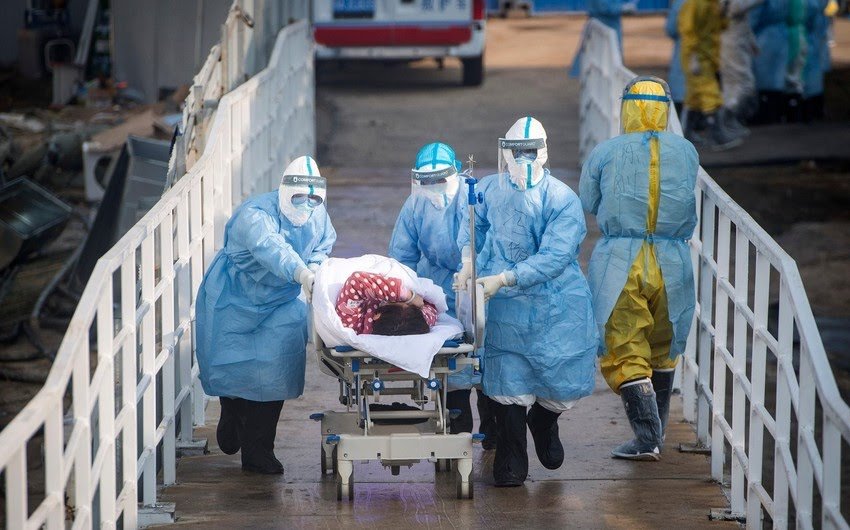For the second day in a row, the world's largest country with a population of more than 144 million people, broke its daily record in new infections and coronavirus-related deaths.
On Friday, Russian authorities registered a record increase in new infections and virus-related deaths with 24,318 new cases and 461 lethal cases confirmed in the last 24 hours, bringing its case tally above 2 million and its death toll to 35,311. Over the last two days, Russian officials also registered a record 456 deaths on November 18 and 463 deaths on November 19.
Although the country has witnessed a surge in cases over recent weeks, the authorities keep ruling out a nationwide lockdown as a measure to slow the spread of Covid-19, opting instead for targeted measures, including enforcing a public mask mandate and requiring some schoolchildren and employees to study or work from home.
Moscow, the country's worst-hit city of more than 12 million residents, remains the epicenter of Russia’s coronavirus outbreak with 6,902 - or more than a quarter - of the cases reported on Friday.
Commenting on the surge in new coronavirus cases, Kremlin spokesman Dmitry Peskov described the outbreak as "very worrying" and said it was President Vladimir Putin's "top priority".
Currently, Russia is the fifth country in terms of the number of infections reported, behind the United States, India, Brazil and France. Since the epidemic hit the world's largest country, Russia has recorded 2,039,926 coronavirus cases, while deaths reached 35,311 in the country of more than 144 million people.
Meanwhile, Russia’s consumer protection watchdog Rospotrebnadzor forecasts that the outbreak would begin declining by February-March next year.
"Usually, when the infection rate starts to go up, we expect a maximum increase over 28 days - two incubation periods," said Deputy Director of Russia's Central Research Institute of Epidemiology Alexander Gorelov.
Speaking of lowering the incidence of Covid-19, Gorelov stressed that it may take time until the epidemiological process to be stable, but the virus continues spreading.
"After that, a steady decrease will take place, just like we witnessed in the spring after May 11. We are likely to enter the decrease phase in February or March," Gazeta.ru quoted Gorelov.
Additionally, Gorelov stressed the importance of the existing sanitary restrictions while the mass vaccination has not started yet.
"When you wear a mask or use hand sanitizer, you are protecting not only yourself but your loved ones. There is no need to introduce draconian measures, so far, we prefer persuasion," he concluded.
Russia hopes to avoid a second nationwide lockdown by accelerating the production of vaccines. However, it is planned to carry out mass vaccination sometime around January-February next year, according to Director of the Moscow-based Gamaleya Research Institute of Epidemiology and Microbiology Alexander Gunzburg.
In August, Russia declared its victory in the global vaccine race, by announcing the approval of a coronavirus vaccine for human use, claiming it as “the first in the world". Developed by the Moscow-based Gamaleya Research Institute of Epidemiology and Microbiology under the Russian Health Ministry, Russia's first vaccine, named Sputnik-V, bears the same name as the world's first satellite launched in 1957 by the Soviet Union during the space race.
First identified in China, the novel coronavirus, or Covid-19, has infected more than 57.3 million people and killed more than 1.36 million worldwide, according to data compiled by Johns Hopkins University. Due to the fact that many people infected with the virus do not experience symptoms, the actual number of cases is likely to be significantly higher.







 President Aliyev emphasized the critical role of the North-South Transport Corridor in fostering transport cooperation between Azerbaijan and Russi...
President Aliyev emphasized the critical role of the North-South Transport Corridor in fostering transport cooperation between Azerbaijan and Russi...
 Armenian sappers commenced on Monday mine-clearance operations in the territories adjacent to the Saint Mary Church in village of Voskepar (Armenia...
Armenian sappers commenced on Monday mine-clearance operations in the territories adjacent to the Saint Mary Church in village of Voskepar (Armenia...
 Russian Foreign Minister Sergei Lavrov has reasserted that Moscow has no intentions to stop the fighting in Ukraine, even if peace talks commence.
Russian Foreign Minister Sergei Lavrov has reasserted that Moscow has no intentions to stop the fighting in Ukraine, even if peace talks commence.
 Iran has refuted reports of alleged damage to Shimon Peres Negev Nuclear Research Centre located southeast of Dimona, Israel, during the recent air...
Iran has refuted reports of alleged damage to Shimon Peres Negev Nuclear Research Centre located southeast of Dimona, Israel, during the recent air...
 The Mine Action Agency of Azerbaijan (ANAMA) reported on Thursday the discovery of a significant amount of explosives in the Khojavand district of ...
The Mine Action Agency of Azerbaijan (ANAMA) reported on Thursday the discovery of a significant amount of explosives in the Khojavand district of ...



